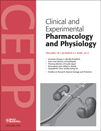
CLINICAL AND EXPERIMENTAL PHARMACOLOGY AND PHYSIOLOGY
Scope & Guideline
Advancing the Frontiers of Pharmacology and Physiology
Introduction
Aims and Scopes
- Pharmacodynamics and Pharmacokinetics:
Research exploring how drugs affect biological systems and how the body processes drugs, including absorption, distribution, metabolism, and excretion. - Mechanisms of Drug Action:
Studies that investigate the molecular and cellular mechanisms through which pharmacological agents exert their effects, including receptor interactions and signal transduction pathways. - Therapeutic Applications:
Papers focusing on the clinical efficacy and safety of pharmacological interventions in various diseases and conditions, including cancer, cardiovascular diseases, and metabolic disorders. - Experimental Models:
Utilization of in vivo and in vitro experimental models to study disease mechanisms and therapeutic effects, often employing animal models or human cell lines. - Translational Research:
Research aimed at bridging the gap between laboratory findings and clinical applications, emphasizing the practical implementation of pharmacological discoveries. - Toxicology and Safety Assessment:
Investigations into the toxicological profiles of drugs and their potential adverse effects on physiological systems. - Innovative Drug Development:
Research on new therapeutic agents, including novel compounds, drug formulations, and delivery systems.
Trending and Emerging
- Molecular Mechanisms of Disease:
There is a growing emphasis on understanding the molecular underpinnings of diseases, particularly through the lens of pharmacological intervention, including studies on RNA modifications and epigenetics. - Biomarkers and Personalized Medicine:
Research focusing on identifying biomarkers for disease prediction and treatment response is increasingly prominent, aligning with the broader trend towards personalized medicine. - Neuropharmacology and Neuroinflammation:
An uptick in studies addressing neuropharmacological interventions and the role of neuroinflammation in various neurological disorders reflects an emerging interest in brain health. - Regenerative Medicine and Stem Cell Research:
There is a rising trend in exploring the therapeutic potential of stem cells and regenerative medicine approaches, particularly in the context of chronic diseases and injuries. - Gut Microbiome and Pharmacology:
Research exploring the interaction between the gut microbiome and pharmacological agents is gaining traction, highlighting the importance of microbiome in drug metabolism and therapeutic responses. - Immunopharmacology:
A noticeable increase in studies related to immunopharmacology, particularly in the context of autoimmune diseases and cancer therapies, reflects a growing interest in targeting the immune system.
Declining or Waning
- Traditional Herbal Medicines:
Research on traditional herbal remedies and their pharmacological effects has decreased, possibly due to a shift towards more evidence-based approaches and synthetic drug development. - Basic Mechanistic Studies:
There is a noticeable reduction in purely mechanistic studies without direct clinical implications, as the journal increasingly favors translational research that connects laboratory findings to clinical applications. - Pharmacogenomics in Rare Diseases:
Interest in pharmacogenomic studies specifically targeting rare diseases appears to be waning, possibly due to the complexity and limited patient populations for such studies. - Epidemiological Studies:
While still relevant, epidemiological studies focusing solely on drug utilization patterns without linking to physiological outcomes are less frequently published. - Animal Studies with Limited Clinical Relevance:
Research that does not translate well to human physiology or lacks clear clinical relevance is becoming less common as the journal emphasizes studies with direct implications for patient care.
Similar Journals

Physiology and Pharmacology
Bridging regional insights with global research.Physiology and Pharmacology is a distinguished open access journal that has been disseminating high-quality research in the fields of physiology and pharmacology since its inception in 1997. Published by the Iranian Society of Physiology & Pharmacology, this journal offers a platform for scholars and practitioners to share innovative findings and advancements that contribute to the understanding of biological systems and drug action. With its ISSN 2476-5236 and E-ISSN 2476-5244, it ensures global reach and accessibility. The journal is positioned in the third quartile for Linguistics and Language and fourth quartile in both Pharmacology and Physiology categories according to Scopus rankings, reflecting a commitment to expanding knowledge within these interdisciplinary domains. Set within the academic landscape of Iran, the journal aims to bridge regional research with the international community, providing valuable insights into physiological processes and pharmacological developments. In light of its open access model, the Physiology and Pharmacology journal plays a crucial role in enhancing the visibility of research outcomes and fostering collaboration among researchers, professionals, and students on a global scale.
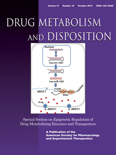
DRUG METABOLISM AND DISPOSITION
Shaping the Future of Pharmaceutical ResearchDrug Metabolism and Disposition is a premier journal published by the American Society for Pharmacology and Experimental Therapeutics, focusing on crucial advancements in the fields of pharmaceutical sciences and pharmacology. Since its inception in 1973, this esteemed journal has established itself as a leading platform for innovative research, earning a prestigious Q1 rating in both Pharmaceutical Science and Pharmacology categories as of 2023. With an impressive Scopus ranking of #52 out of 183 in Pharmaceutical Science and #105 out of 313 in Pharmacology, it occupies a vital place in an increasingly competitive academic landscape. Researchers, professionals, and students alike benefit from its rigorous peer-reviewed articles that delve into drug metabolism processes and their physiological implications, making it an indispensable resource for anyone aiming to advance their understanding of drug disposition and efficacy. This crucial journal contributes significantly to the ongoing dialogue in pharmacology and toxicology, providing insights that help shape future therapeutic strategies and regulatory policies.
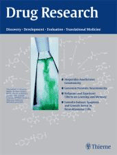
Drug Research
Pioneering Insights for Future TherapiesDrug Research, published by GEORG THIEME VERLAG KG, is a pivotal journal housed in the vibrant realm of pharmacology and drug discovery. With a commitment to advancing the understanding of medicinal substances, this journal serves as an essential resource for researchers, professionals, and students dedicated to the field. The journal boasts an ISSN of 2194-9379 and an E-ISSN of 2194-9387, reflecting its dual commitment to print and digital accessibility. Despite its status as a Q3 journal in both Drug Discovery and Miscellaneous Medicine categories as of 2023, it continues to offer valuable insights with a focus on the latest innovations, methodologies, and findings in drug research. Based in Germany, Drug Research promotes scholarly communication and collaboration within the scientific community, ensuring that its contributions remain impactful in shaping future therapeutic discoveries. The journal is indexed in relevant databases, enhancing its visibility and reach, thus fostering a robust academic dialogue.

Frontiers in Pharmacology
Exploring innovative pathways in pharmacological research.Frontiers in Pharmacology, published by FRONTIERS MEDIA SA, stands as a leading open-access journal dedicated to advancing the field of pharmacology since its inception in 2010. With its ISSN 1663-9812, the journal is based in Switzerland and maintains a vital role in disseminating innovative research findings that span various disciplines within pharmacology, including pharmacokinetics, toxicology, and pharmacogenetics. In 2023, Frontiers in Pharmacology has achieved an impressive standing within the scientific community, being ranked in the Q1 category for both general and medical pharmacology, highlighting its critical contribution to the field with a Scopus ranking of #41 out of 272 in medical pharmacology and #76 out of 313 in pharmacology, toxicology, and pharmaceutics, placing it in the 75th and 85th percentiles, respectively. Researchers and practitioners benefit from its open-access model, which ensures widespread accessibility to groundbreaking research, fostering collaboration and innovation across the pharmaceutical sciences. With its commitment to excellence, Frontiers in Pharmacology serves as an essential resource for those looking to explore and contribute to the latest advancements in pharmacological research.

European Journal of Pharmacology
Advancing drug discovery through innovative research.The European Journal of Pharmacology, a prestigious publication by Elsevier, serves as a vital resource in the field of pharmacology, offering rich insights into drug development and therapeutic applications. Since its inception in 1967, this journal has evolved to encompass groundbreaking research, including pharmacokinetics, toxicology, and innovative pharmacological methodologies, making it an essential platform for researchers and professionals alike. With an impressive impact factor that places it in the Q1 category of pharmacological journals and a Scopus ranking of #49 out of 313, the journal is recognized in the 84th percentile within its category, solidifying its significance in the academic community. Although the journal is not open access, it continues to attract contributions from leading scientists worldwide, ensuring that cutting-edge findings are disseminated effectively. The European Journal of Pharmacology not only highlights advancements in drug discovery and clinical applications but also promotes interdisciplinary collaboration, ultimately contributing to the progress of healthcare globally.
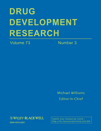
DRUG DEVELOPMENT RESEARCH
Exploring the frontiers of drug discovery and development.DRUG DEVELOPMENT RESEARCH is a premier interdisciplinary journal published by Wiley, focusing on the latest advancements in drug discovery, pharmacology, and toxicology. With an ISSN of 0272-4391 and an E-ISSN of 1098-2299, this esteemed publication has been a cornerstone in the field since its inception in 1981 and continues to provide cutting-edge research until 2024. Its rigorous peer-review process and strategic placement in Q2 of the Drug Discovery category, as well as ranking #60 out of 157 in Scopus, underscore the journal's relevance and influence, boasting a respectable 62nd percentile ranking. While the journal does not currently offer open access, it remains a vital resource for researchers, professionals, and students seeking to expand their knowledge on the processes of drug development, identifying new therapeutic targets, and assessing the efficacy and safety of novel compounds. Situated in Hoboken, NJ, this journal stands at the forefront of pharmaceutical innovation, making significant contributions to the advancement of medical science.
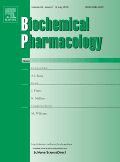
BIOCHEMICAL PHARMACOLOGY
Exploring the synergy between biochemistry and therapeutics.BIOCHEMICAL PHARMACOLOGY, published by PERGAMON-ELSEVIER SCIENCE LTD, stands as a leading international journal devoted to the advancing field of biochemical pharmacology. Since its inception in 1958, the journal has continuously offered a platform for innovative research, delivering critical insights into the interaction between biochemical processes and pharmaceutical applications, and now converges towards its 2024 edition. With an impressive Q1 ranking in both Biochemistry and Pharmacology categories, it ranks 32nd out of 313 in Pharmacology and Toxicology, and 58th out of 438 in Biochemistry according to Scopus, showcasing its significant impact within the scientific community. Researchers and professionals rely on this journal to keep abreast of essential developments, given its robust peer-review process and a comprehensive selection of articles that span experimental studies, clinical trials, and theoretical analyses. Although not an Open Access journal, it remains pivotal for those seeking to advance their knowledge in the dynamic fields of biochemistry and pharmacology. With its high impact factor and emphasis on quality research, BIOCHEMICAL PHARMACOLOGY continues to be an invaluable resource for students, researchers, and industry professionals striving to make breakthroughs in drug development and therapeutic strategies.
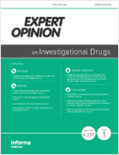
EXPERT OPINION ON INVESTIGATIONAL DRUGS
Navigating the Landscape of Drug DevelopmentExpert Opinion on Investigational Drugs, published by Taylor & Francis Ltd, is a premier journal dedicated to the dissemination of high-quality, peer-reviewed research in the fields of pharmacology and medicine. As an integral part of the scientific community since its inception in 1994, this journal has established itself as a leading source of insightful analysis and expert commentary on emerging drug therapies, providing invaluable resources for researchers, clinicians, and healthcare professionals. With an impressive impact factor and ranking in the top quartile across multiple pharmacological categories, it remains a vital platform for discussing innovative drug developments and their clinical applications. Though it operates on a subscription basis, Expert Opinion on Investigational Drugs is crucial for anyone involved in pharmacological research and the drug development process, positioning itself at the forefront of medical advancements and offering critical insights into the rapid evolution of investigational therapies.
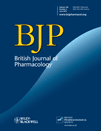
BRITISH JOURNAL OF PHARMACOLOGY
Pioneering insights into drug mechanisms and therapeutic innovations.British Journal of Pharmacology is a premier, peer-reviewed journal published by Wiley, specializing in the dynamic field of pharmacology. With a robust impact factor, this journal ranks in the top quartile (Q1) for pharmacology according to the 2023 category rankings, emphasizing its significance and reputation among the global scientific community. As an essential resource for researchers, professionals, and students alike, the journal provides a platform for innovative research spanning foundational studies to clinical applications in pharmacology, toxicology, and pharmaceutics. Since its inception in 1966, the journal has consistently contributed to the advancement of pharmacological science, fostering a deeper understanding of drug action mechanisms and therapeutic advancements. Although primarily subscription-based, the British Journal of Pharmacology is committed to disseminating high-quality research that shapes the future of the field.
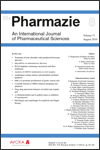
PHARMAZIE
Pioneering insights in toxicology and pharmaceutics.PHARMAZIE is a prestigious, peer-reviewed journal published by AVOXA-MEDIENGRUPPE DEUTSCHER APOTHEKER GMBH, focusing on the dynamic field of pharmaceutical science since its inception in 1947. With its ISSN 0031-7144 and a current impact factor placing it in the Q2 category of Pharmaceutical Science journals, PHARMAZIE has established itself as a pivotal resource for researchers, practitioners, and students alike. The journal emphasizes the dissemination of high-quality, original research in pharmacology, toxicology, and pharmaceutics, contributing to the advancement of knowledge and innovation in these fields. While currently not open access, the journal maintains a commendable Scopus rank of #94 out of 183 in its category, highlighting its relevance and appeal to the academic community. With a commitment to bridging the gap between research and practical applications, PHARMAZIE plays a crucial role in shaping the future of pharmaceutical practices and policies.